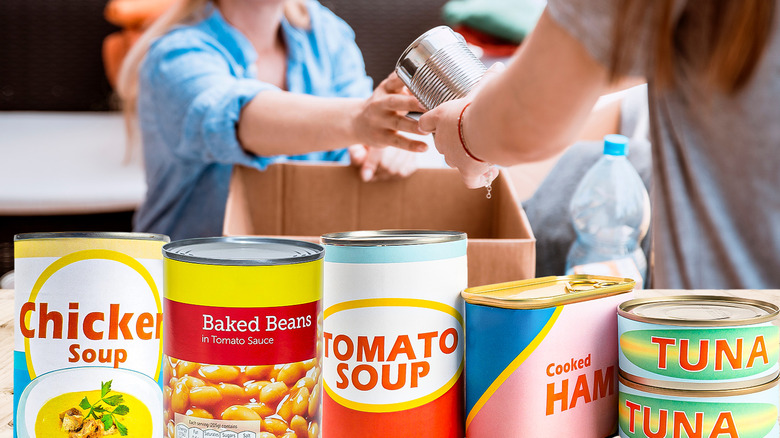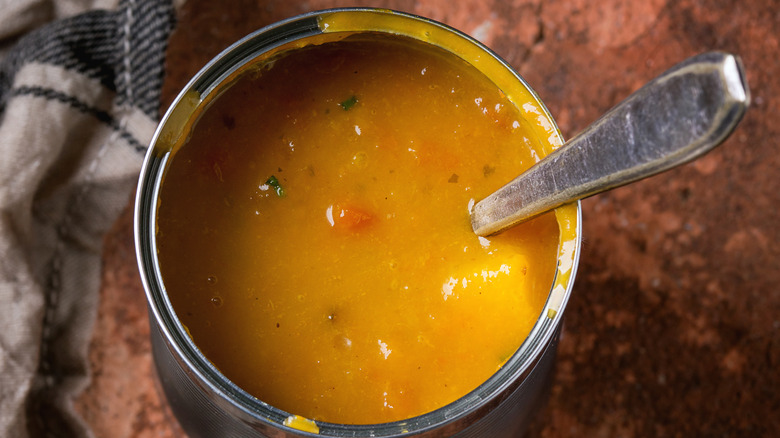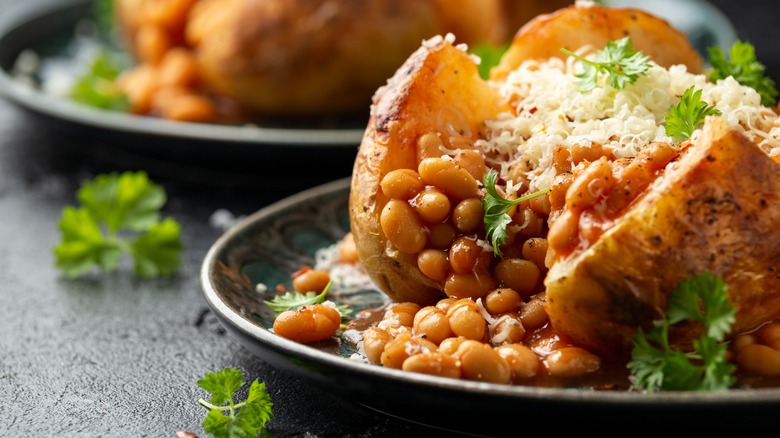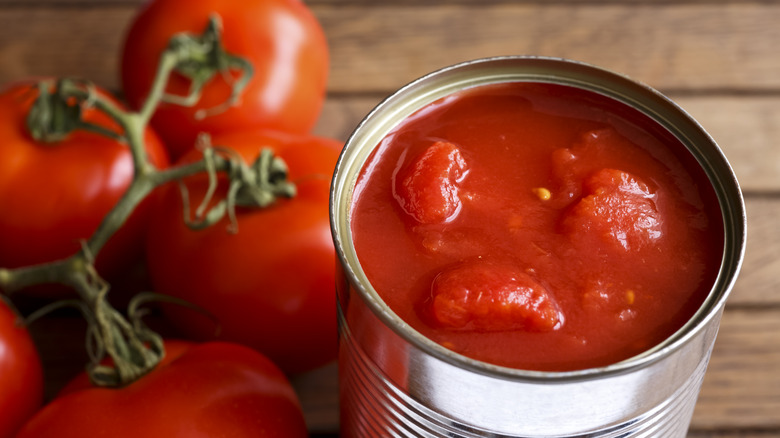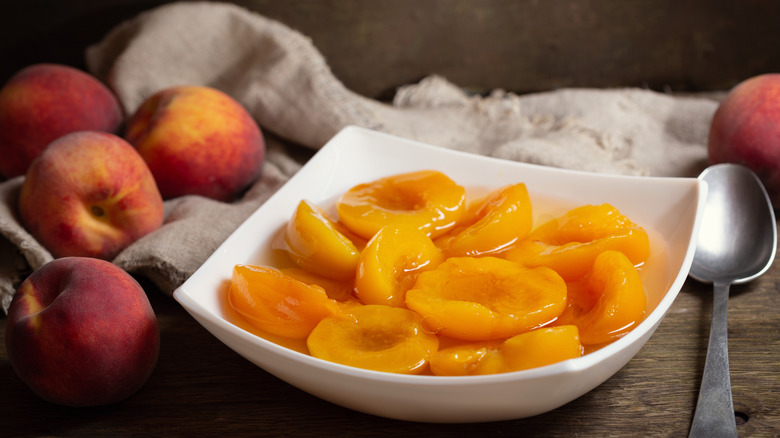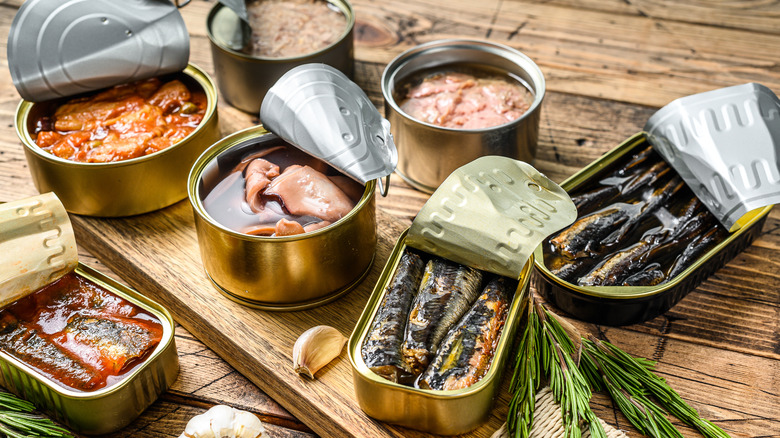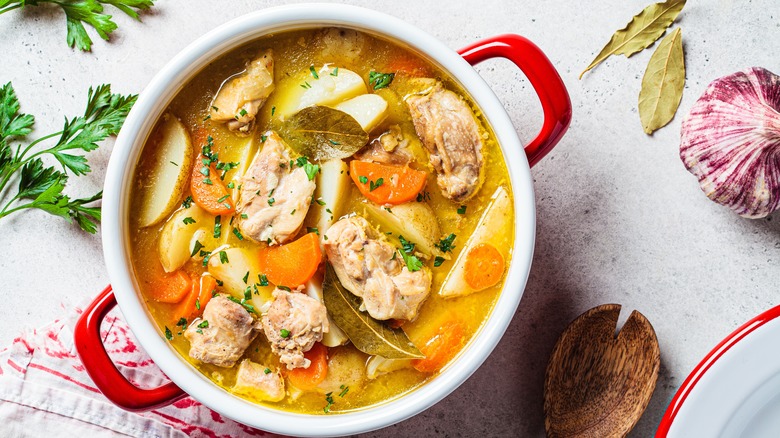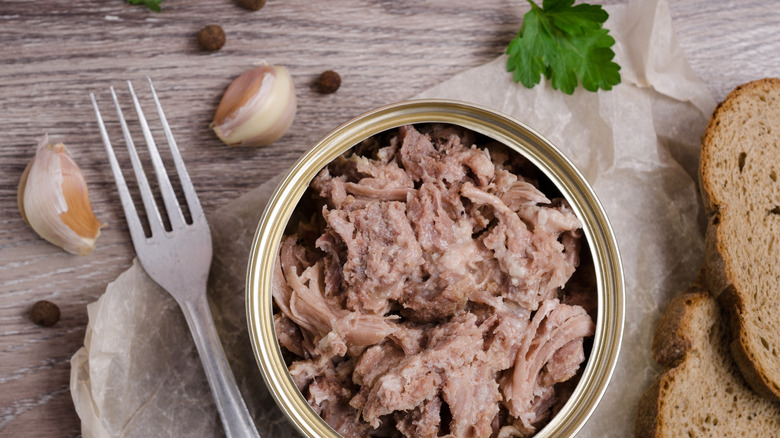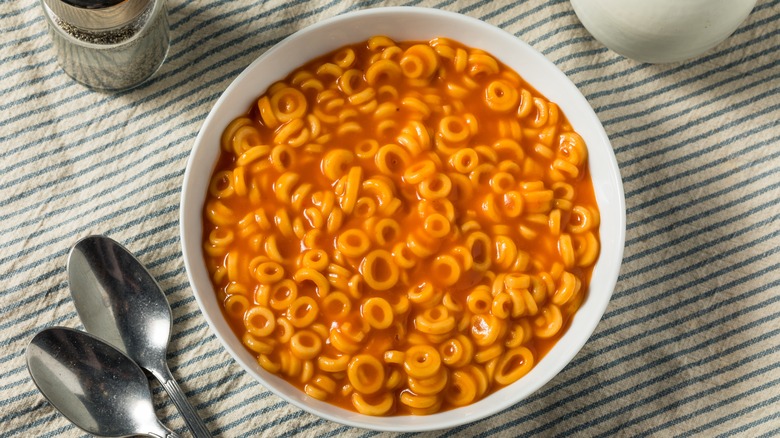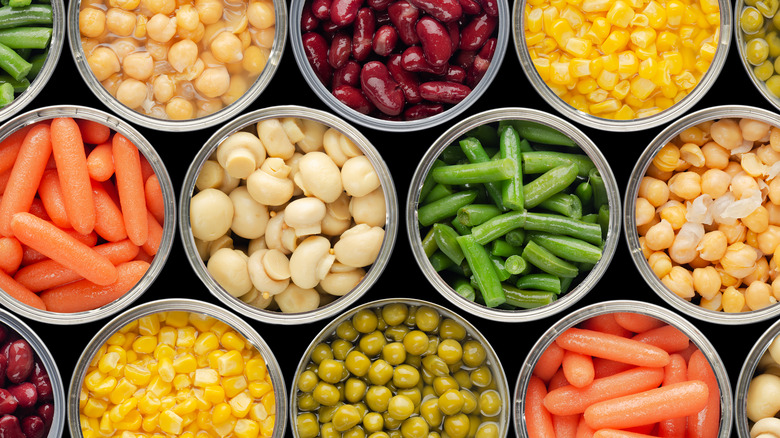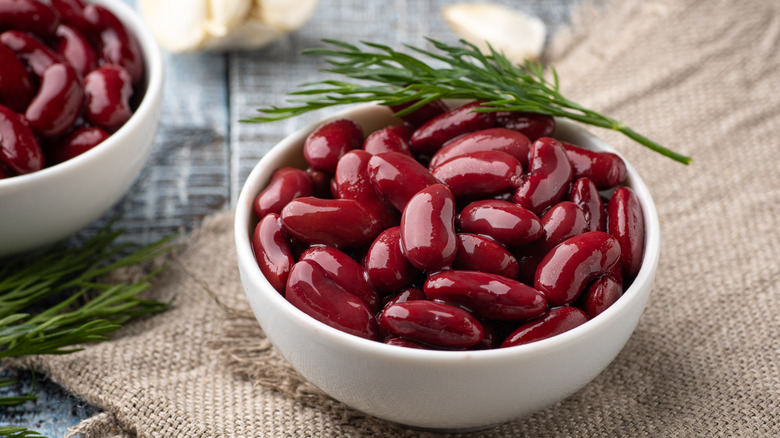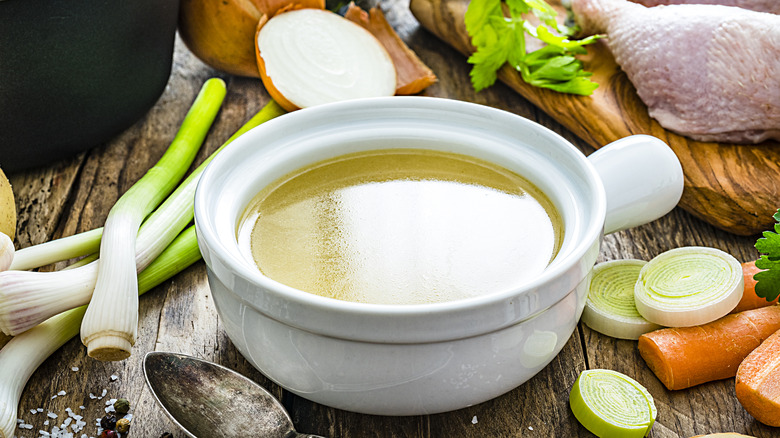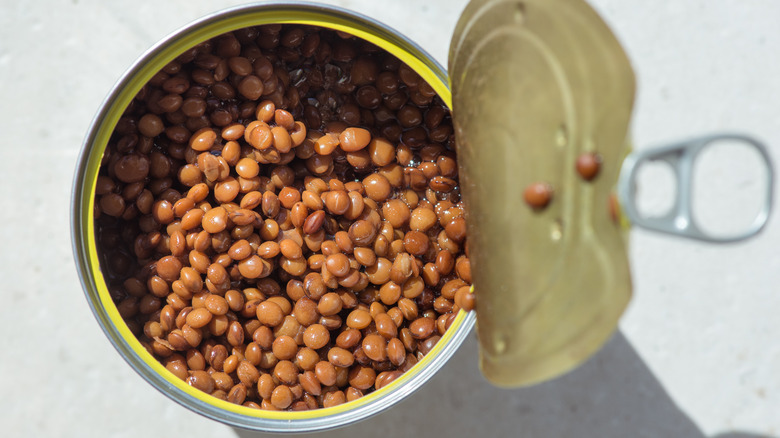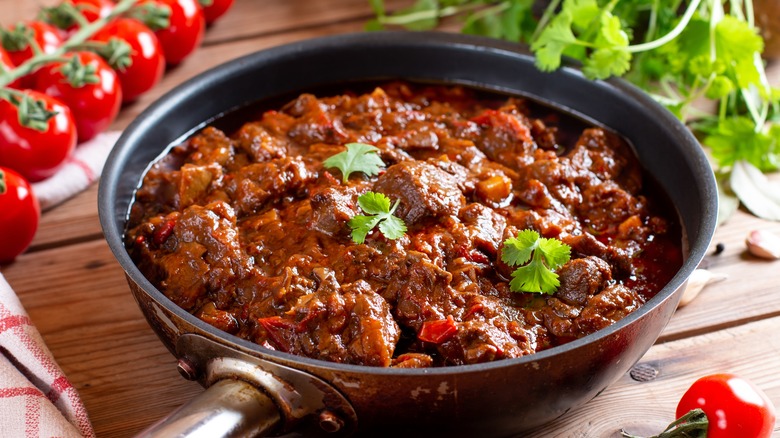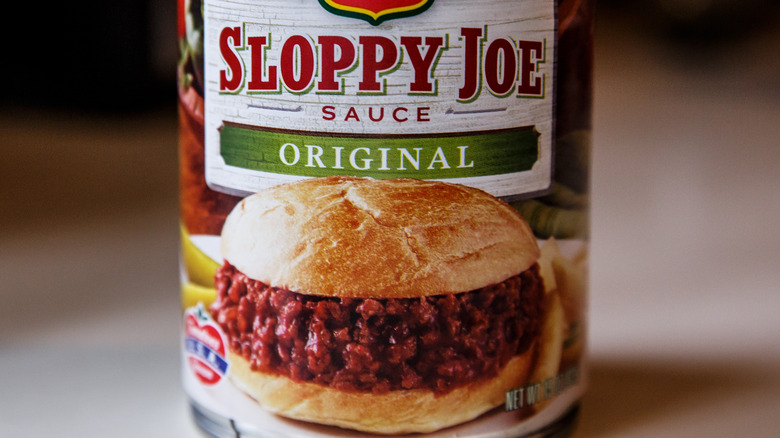15 Best Canned Foods To Donate
We live in a world where access to fresh produce isn't always guaranteed, people from many walks of life are affected by food insecurity, and millions of families rely on charity assistance. Food banks, shelters, emergency relief projects, and charities that serve vulnerable children, the older population, and veterans are seeing ever-increasing demand. Donating food can transform the lives of many — but it might feel daunting. Your first point of call should be to seek out your local food-assistance programs, which usually provide a list of items they consider the highest priority.
Although unassuming, canned foods are nonperishable, don't take up much space at home, and offer some of the best nutritional balance — often just as robustly as fresh food — to make them a perfect donation item. Moreover, canned goods are especially beneficial for people who may not have access to cooking equipment like appliances or cookware.
We've selected the items on this list based on strict criteria: they must be nourishing, filling, and versatile. Some are suitable to eat straight from the can, such as spaghetti and meatballs, while others, like canned beans or vegetables, may require a few other staple ingredients. When donating, make sure the cans are in perfect condition and within their expiration date, and whenever possible, choose cans with a ring-pull for easier access, eliminating the need for a can opener. Okay, let's jump into how you can make a difference — one can at a time.
Soups
Canned soups make an excellent donation choice. Why? They provide a quick, comforting, and often nutritious meal that only requires warming, not cooking. Ready-made meals — like soup — can be eaten cold or quickly warmed up with a microwave, oven, stovetop, or campfire, and offer convenience for anyone struggling with housing or access to cooking equipment.
Furthermore, most soups contain essential nutrients and vitamins. Commonly available soups like chicken noodle, split pea, beef and vegetable, lentil, clam chowder, or cream of chicken are great to consider donating, as they are full of protein. On the other hand, soups with potatoes or pasta, such as minestrone or Italian wedding soup, offer vital carbohydrates, which are a great source of fiber and energy. Finally, classic vegetarian soups, including cream of mushroom, tomato, cream of spinach, broccoli and cheddar, or cream of celery are all likely to deliver at least one of the five servings of fruit and vegetables recommended daily.
When considering which soups you should donate, we recommend avoiding cans with high salt levels. Processed food, while convenient, is often high in salt, which increases the risks of high blood pressure.
Baked beans
Baked beans make a popular donation choice for several reasons: they're versatile, can be enjoyed cold, and are packed with plant-based proteins, fiber, and carbohydrates. Plus, they contribute to your recommended daily intake of fruit and vegetables.
Unlike a few items on this list, baked beans work doubly well for breakfast, lunch, and dinner. In the U.K., people commonly have baked beans for breakfast, often eating them straight out of the can (yes — really!) or pairing them with inexpensive and readily available food staples like bread or potatoes. However, the difference between British Heinz beans and American-style baked beans is an entirely different beast; British beans swim in a tomato-based meat-free sauce, while Americans are used to smoky and sweet brown sugar and bacon flavorings. While the latter may not be as versatile (people typically enjoy it as a barbecue side), either will be welcome donations. Ultimately, it's important to note that canned baked beans can be very high in sugar and sodium, so check nutrition labels if purchasing cans to donate.
Tomatoes
Canned tomatoes are a pivotal base for countless quick, straightforward recipes that are easy to prepare in the microwave or on the stovetop. For example, once heated in the microwave, people can serve canned tomatoes on toast or transform them into a rustic pasta sauce with simple salt and pepper seasoning. A slightly more filling option might combine tomatoes with rice, canned fish, and vegetables to create a microwaveable rice meal. Alternatively, tomatoes work well with canned pulses, vegetables, and curry powder, blending to make a wholesome and nourishing meal packed with beneficial minerals and vitamins.
Canned tomato options commonly include peeled plum, stewed, diced, and crushed tomatoes. Each option has benefits. Namely, while plum tomatoes allow direct consumption from the can, stewed and crushed tomatoes are better for cooking. As a matter of best practice, it's advisable to call in advance and find out which type your local food bank needs.
Fruit in juice
Fresh fruit is not only perishable — it's also seasonal, regionally inaccessible, and costly. Conversely, canned fruit offers nutritional benefits similar to fresh produce and is more easily given to those in need.
When people consider donating food, most opt for dinner essentials. Snacks and desserts, while sometimes overlooked, play a crucial role in maintaining a balanced and healthy diet, and canned fruit fits the bill perfectly. Most have the added benefit of being pre-cut, meaning anyone who doesn't have access to knives can enjoy them without struggle. Plus, they're wonderfully versatile — people can use canned fruits in children's lunchboxes or incorporate them into other affordable savory or sweet meals to provide more well-rounded options. For example, canned mandarins can jazz up basic pasta salad, a simple meal that's easy to make with another donated staple, pasta. It's also easy to incorporate the king of all canned fruits, pineapple, into many types of meals, boosting the flavor of fried rice or — don't shoot the messenger — pizza.
Fish
Contrary to the widespread belief that canned foods are unhealthy, canned fish matches fresh fish in its rich content of omega-3 and omega-6 fatty acids. Some of the most commonly canned fish — such as salmon, sardines, tuna, and mackerel — are also rich in vitamin D and iron, among other benefits. These nutrients are crucial for overall well-being by aiding in muscle repair, immune function, and cardiovascular health, making canned fish a valuable addition to meals, especially for those facing food insecurity. However, most donation centers suggest choosing canned fish packed in brine instead of oil, if possible.
Additionally, canned fish is incredibly versatile, enabling individuals and families to prepare quick, nutritious meals without requiring extensive cooking skills or equipment. There are many ways to use canned seafood in pasta dishes, offering an effortless and satisfying meal with lean protein and carbohydrates. Combined with potatoes, canned salmon makes affordable yet delicious croquettes, ideal for a gourmet lunch without the price tag. That's not to mention the crowd-pleasing favorite: tuna sandwiches, quintessential for families without much time to spare or means to cook hot foods.
Stew
Much like soup, stew is a comforting and hearty meal that's especially appreciated during the harsh winter season, which often magnifies the struggles of those dealing with housing or food insecurities. It's easy to overlook these simple, homey meals in a can, yet as stews often contain the three vital components of a balanced diet — proteins, vegetables, and carbohydrates — it's one of the most priceless donations you can make.
Like other canned meals, the long shelf life of canned stew makes it a reliable source of sustenance when access to fresh food is scarce, when there's no time to combine other ingredients, or when the only means of heating food is a microwave. For anyone facing these circumstances, canned stew can become a lifeline.
Although beef stew is the variety most frequently available, we suggest picking up a few cans of chicken stew, vegetable stew, or alternative options your local grocery store may stock to accommodate diverse dietary choices.
Meats
Protein is an essential element of a balanced diet, and is often the priciest part of grocery shopping, making canned meat donations some of the most priceless. However, canned meats come with a small caveat: they are best when cooked. Despite being safe to eat straight from the can, cooking does wonders to enhance their flavors. Nonetheless, don't let this put you off donating — many people relying on food donations still have the means to cook.
Among the wide range available, we can highlight several canned meats good for stocking in any pantry. For example, Spam, an accessible processed pork and ham mixture, enjoys much fanfare in Hawaii and is becoming trendy nationwide despite previous negative connotations. Spam is a fantastic choice for umami-packed sliders, needing only a few seconds of searing, canned pineapple chunks, and bread rolls. Other canned meats, such as ham, can feed a whole family and would be particularly appreciated during the holiday season. Alternatively, beef chunks or chicken breast can be warmed up and served with any number of sauces alongside a staple donation like rice or potatoes.
Pastas
Food banks often prioritize dried pasta due to its immense demand and versatility. Nonetheless, canned pasta — primarily available as ready meals — also has its place. These options are conveniently ready to eat straight from the can, offering an alternative option in emergencies or for those without access to cooking facilities.
Most of us have fond memories of eating canned pasta as children, so it's sure to be a donation that's appreciated by anyone facing challenging circumstances — but especially those with children to feed. Our top recommendations include macaroni and cheese. It's one of the ultimate comfort meals, and just like nostalgic SpaghettiOs, mac and cheese has the benefit of being suitable for a wide range of religious and ethical dietary requirements. That being said, these simple pastas can be bulked up with canned meats or vegetables.
Other options, like classic spaghetti with meatballs, come pre-cooked in a rich tomato sauce, offering essential proteins and carbohydrates necessary for boosting energy. Mini ravioli and lasagna are excellent options too.
Vegetables
Canned vegetables are an invaluable donation to food banks and shelters for various reasons. Firstly, they are durable and have a longer shelf life compared to fresh produce, ensuring extended availability for those in need. They also offer a wide array of options, providing flexibility in meal preparation — and all canned vegetables come pre-prepped, meaning no knives or other kitchen equipment is required.
Moreover, if you're questioning whether canned food contains less vitamins than fresh food, the answer likely leans no. Studies vary, but scientists generally agree that if vegetables are canned immediately after picking, there's minimal loss in nutritional value. In fact, fresh vegetables might be less nutritious depending on their storage after harvesting.
When deciding which canned vegetables to donate, there are two choices: opting for staples (like carrots, peas, sweet corn, and versatile canned potatoes) or selecting vegetables that have a very short season and shelf life, such as asparagus, spinach, mushrooms, and artichoke hearts.
So if you have a tight budget for making food donations, canned vegetables rank high on our list of priorities. They're cost-effective and play a crucial role in addressing food poverty. Obtaining fresh, nutritious food is often challenging for many because of limited regional availability, high expense, and seasonal fluctuations. Canned vegetables are a vital solution to these challenges, offering a reliable source of essential nutrients.
Beans
Deciding which foods to donate requires considering their versatility, especially if the dish isn't a complete meal. That's exactly how we chose to include this option — since beans are a staple ingredient across countless cultures, their versatility is unmatched.
Your local grocery store should have a multitude of possibilities to choose from. Canned options usually include pinto beans, black beans, kidney beans, cannellini beans, lima beans, and garbanzo beans. You can already see the unbelievable assortment of choices and potential meals. Determining the best uses for canned black beans can be challenging; they can be used in burritos, soups, and even brownies, showcasing their adaptability. Any other beans are just as flexible: homemade chili prepared with canned beans, canned tomatoes, and canned meat chunks is one prospective plate, while bean-based dips don't require cooking, just a food processor.
Of course, another standout factor is that canned beans are exceptionally nutrient-dense, offering protein, iron, folate, minerals, and fiber — and high-fiber foods are particularly sought after, as they leave you feeling full for longer.
Broth
Canned broth may be an unusual recommendation for donation. However, it stands out as an ingredient capable of elevating basic meals into flavorsome concoctions. In many food-insecure households, crafting meals from scratch isn't always feasible due to time constraints or limited access to fresh ingredients. Canned broth bridges this gap, offering a tasty base for soups, stews, casseroles, and rice dishes, enabling recipients to create meals with a bundle of extra umami.
Perhaps most vitally, canned broth is an easy way to add nutrients to the diets of people who rely on food banks. It contains essential minerals for overall health. Similarly to other canned foods, the long shelf and convenient storage of canned broth make it a practical choice as a staple donation or an emergency food supply.
While bone broth, chicken broth, and beef broth are great choices, consider donating vegetable broth as well for vegetarians and vegans. We highly advise picking a low-sodium brand of any broth, as the recipients may also drink the broth straight from the can as a wholesome beverage.
Lentils
Dried lentils, known for their affordability, allow individuals to incorporate plant-based proteins into their diets, and they store well for years in the pantry. However, dried lentils have one major issue: they take a long time to cook, often needing to simmer for hours to soften. Canned pre-cooked lentils provide a ready-to-eat solution with ample protein and lower fat content than animal-based proteins. On that note, lentils are a lifesaver for vegetarians and vegans struggling with food poverty, allowing them to reach healthy nutritional levels while maintaining their lifestyle choices. But that's not all; omnivores also reap benefits from the many ways to use canned lentils.
Lentils make a great base for salad bowls. Another good option is to toss them with some canned vegetables and top them with mashed potatoes for a comforting and nutritious plant-based shepherd's pie. Canned lentils can also be used for delicious homemade curries, whipped up with a can of stewed tomatoes and a pinch of spices.
Prepared meats
Many consider reducing our consumption of highly processed foods as essential. As a result, throughout this list we've emphasized donating whole foods. All canned food goes through processing by definition — but some more so than others. Hot dogs and meatballs fall into the "more so" category, compared with chicken breasts or beef chunks. However, while we must keep health concerns at the forefront of our minds, it's important to note that ease of cooking and preparation is paramount for anyone relying on food donations, and canned prepared meats are ideally easy. There's no need for further cooking or seasoning the meat.
Canned processed meats can also offer a familiar choice for children who may face sudden and unexpected food poverty. Pairing other donations to shelters or food banks — like hot dogs with bread rolls and meatballs with dried pasta and canned pasta sauce — can provide for relatively healthy meals with minimum cooking involved.
Ready-to-eat meals
When you think about donating food, ready-made meals like chili con carne or chicken alfredo are among the top items that come to mind. There's a good reason these canned items are in high demand: no chopping, preparing, or additional ingredients are needed to make a filling meal for the whole family ... although a pairing donation of rice — a staple food for many communities and an easy source of carbohydrates — wouldn't go to waste.
As mentioned, chili con carne is one of the complete meals you can donate, being a widely beloved dish that's spicy, comforting, and nutritionally rich. Canned chili boasts plant-based proteins from beans and ample amounts of meat (although vegetarian bean-based chili is a great option to ensure diversity of donations). It's also straightforward for beneficiaries to add more flavor to canned chili with only a few extra ingredients. Another Mexican-style dish, canned tamales, is also a viable option.
In the U.K., canned curry is a favorite. Because it can be hard to build a spice collection, canned meals that are highly seasoned can be a real treat, and Indian food definitely meets that criteria. Canned curry varieties include chicken korma, mixed vegetable, chicken tikka masala, and peppery jalfrezi. When canned curry is combined with a bag of microwavable rice, someone will have access to a healthy meal with scarcely any cooking required.
Sauces
While canned sauces aren't enough for a balanced meal, they can elevate an ordinary, bland dish into a flavorful, well-rounded plate that excites the cook's palate. Several homemade sauces demand either slow cooking or extensive ingredient lists, so having everything all prepared in a can makes a considerable difference.
As an added bonus, most canned sauces complement other items likely to be donated to food banks or shelters. For example, a can of sloppy joe sauce only needs an additional can of ground meat and bread rolls or burger buns to feed a family of four. Likewise, people can use sauces with canned beans or lentils, pair pasta sauce with dried pasta, top pre-made pizza bases with it, or even consume it as soup. Canned enchilada sauce is another great option to consider donating — it's a crowd-pleaser that usually develops its heavenly rich flavor notes after long simmering times, so this is a real luxury to have pre-made.
In short, canned sauces can be enormously valuable for people relying on donations. However, as they're typically not a balanced meal on their own, we encourage you to consider what people may like to pair with the sauces, and donate those foods as well.
